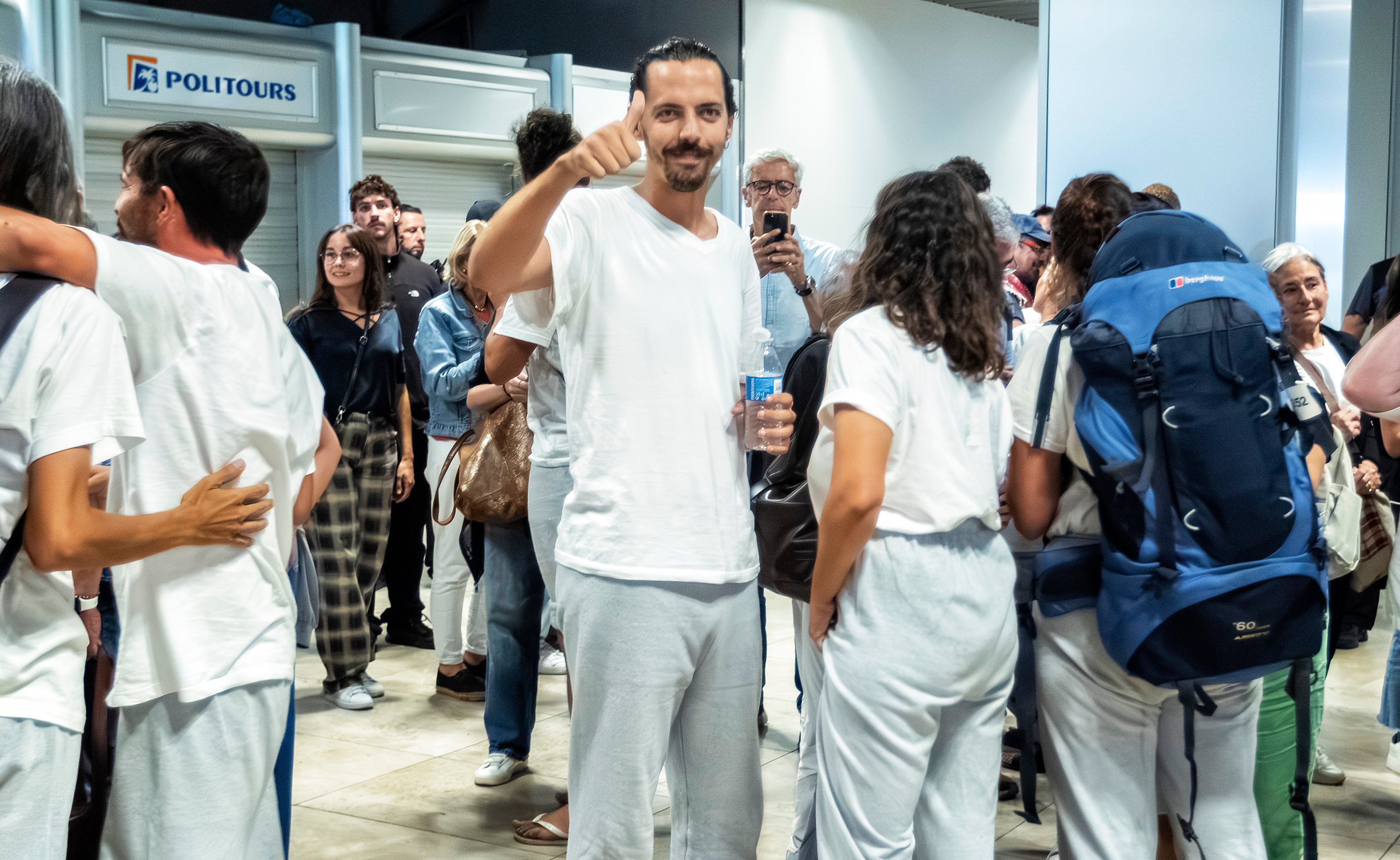Carlos de Barrón recounts the humiliation, psychological abuse, aggression, and intimidation that he and the rest of the crew suffered during their three-night detention in an Israeli prison
Defining the experience I endured from early Thursday morning to Sunday is very difficult. But inhumane and extreme are two adjectives that fit. Humiliation, psychological abuse, physical aggression, intimidation, and, ultimately, an endless array of actions and behaviors aimed at making us feel extremely vulnerable. So much so that, at any moment, a wrong move or a bad response could lead to a situation where all you knew was that you would come back in a much worse state. This is what I witnessed, suffered, and felt from the moment at least four Israeli military ships intercepted the Captain Nikos — the vessel I was aboard, accredited as a journalist on the Global Sumud Flotilla, a humanitarian mission whose main objective was to deliver aid and medicine to the Gaza Strip — until Sunday, when 20 colleagues and I were released and returned to Spain.
The night from Wednesday to Thursday seemed endless. Around 7:00 p.m local time, the Alma, leading the mission, was the first to be attacked by heavily armed soldiers. The alert level was at its highest, and we had all prepared for that moment. Then began an endless stream of information about vessels being attacked. On the Captain Nikos, we suddenly saw a large military vessel approaching and blinding us with a huge spotlight. Everyone on board braced. However, at the last moment, we saw it turn and ram the Spectre, a ship that had been following us at close range. A moment of great confusion ensued, and the ship’s captain decided to continue onward.
We experienced a similar situation on three other occasions, with military vessels surrounding our ship but failing to intervene. Finally, at 6:30 a.m., with the first rays of light flaring, we saw in the distance what would become the soldiers who would forcefully put an end to Captain Nikos’s humanitarian mission.
At least four boats surrounded us and, while pointing their machine guns at us, demanded we come to the deck. About a dozen soldiers boarded the vessel with a clear message in English: “Anyone who does not obey our orders will suffer the consequences.” They destroyed the cameras, searched the entire ship, and found that even the kitchen knives had been thrown into the sea to demonstrate the nonviolent nature of the mission.
About five hours later, we arrived at the Israeli port of Ashdod. “We’re the first,” the military commander told us, smiling. I began to wonder if this would offer any advantages, but all I could think of were disadvantages. A mass of police officers awaited us, and to one side, I identified Itamar Ben-Gvir, the Israeli minister of national security and the mastermind of the operation.
Fear gripped us. The treatment we received from the military on the boat was acceptable, even better than expected, but we sensed we were about to face a new, completely different scenario. And it didn’t take long for this to be confirmed. The moment we stepped onto dry land, two police officers made us walk a few meters with our hands behind our backs and then forced us to our knees. “You are terrorists,” Ben-Gvir, one of the most extremist members of Benjamin Netanyahu’s administration, told us, while we weren’t even allowed to raise our heads.
After kneeling for a time that was difficult to estimate, but long enough to make my joints ache, we were searched and booked by the police. Before reaching the designated warehouse, one of the two officers escorting me saw the press vest I was wearing and, after saying, “Press, huh?” elbowed me in the back of the head to force my head down, as low as waist level. He kept me in this position for about an hour, the duration of the search process.
Shortly after, we were crammed into a police van in sweltering temperatures for nearly three hours. Our shirts and hair were soaked with sweat. These were moments of great anguish. Almost unable to breathe, the complaints we made in the form of banging on the walls of the vehicle provoked a reaction from the police, who then decided to turn the air conditioning on full blast. They kept us in that cold for five or six hours until we arrived at the prison. The guards’ laughter as they watched us get out, frozen to the bone, was accompanied by comments like “poor terrorists.”
There we were taken to an open-air cell, where I reunited with some people from my ship, and we cried together, hugging each other. I also saw how Lionel Simonin and Pascal André, also crew members of the Captain Nikos, were transported blindfolded and shackled. I also watched, distressed, as the first of them had a visible mark on his face, the result of an assault.
The cold increased, and I spent several hours in that cage until they dressed me in prison garb and took me to a cell in a nearby unit. More than 12 hours had passed since my arrest, and I was denied access to food or drinking water. Shortly after I fell asleep, prison guards repeatedly burst in. Sometimes to conduct a headcount, on other occasions to add more inmates to the cell.
This pattern was repeated during the three nights I was in the prison in southern Israel. But with several additions. Between six and eight officers, armed with assault rifles, pistols, shotguns, and pepper spray, burst in every two or three hours. Sometimes even with dogs.
They pointed their guns at vital parts of our bodies, like our hearts and heads. The green laser pointer from their weapons could be seen on several prisoners. Completely randomly, they would choose four, five, or even six people and move them to another cell. On two occasions, I was one of those selected. I would enter the new cell completely terrified and hoping to see a familiar face. On one occasion, there were no mattresses left, so I had to make a bed with blankets given to me by other inmates. I asked for a mattress, but the guard responded by bringing me another blanket.
During the day, we were not allowed to leave our cells, a privilege reserved only for those who were authorized to receive consular support. In the case of the Spaniards, there were fewer than 10 people, and most of them were allowed only a one-minute meeting.
Access to medicine was also denied. Two people in the unit where I was held suffered from diabetes and went three days without insulin or medical attention. When a doctor was requested, the initial response was: “There are no doctors for animals like you.” Another inmate suffered an asthma attack, and it took more than three hours for a medical specialist to arrive. A 70-year-old woman had heart problems and needed some pills. When she asked for them, the response she received was: “It’ll be a problem when your heart stops.”
Maheb, a 29-year-old Tunisian citizen, showed me, when we shared a cell, how bruised his right side was. “At the port, I had Palestinian stickers in my pockets and the flag. I shouted ‘Free Palestine’ before disembarking. When they caught me, they took me to a single room and beat me for 15 minutes while I was on the floor,” he told me.
We never had access to drinking water. Every time we asked for it, the guards responded with smiles or a “later, later,” which never came. The food was in questionable condition most of the time. On other occasions, it was past its expiration date, as could be seen from the shells of the boiled eggs they gave us.
Finally, in every interaction with prison guards, they always sought to provoke a reaction from the prisoners. This gave them carte blanche to isolate them and leave them for hours in the sun, shackled by their hands and feet.
What we experienced in prison led all of us inmates to a shared reflection. If they were capable of treating us like this — many of us Westerners and from countries that maintain relations with Israel — what will they do to the Palestinian prisoners? The sense of total impunity was one of the greatest frustrations for all of us who were imprisoned, but also for those who remain there, estimated to number more than 200. Many of them are on hunger strike.
Sign up for our weekly newsletter to get more English-language news coverage from EL PAÍS USA Edition
[SRC] https://english.elpais.com/international/2025-10-06/el-pais-journalist-on-the-gaza-flotilla-the-israeli-guards-told-us-there-are-no-doctors-for-animals-like-you.html
 Visit the website
Visit the website





